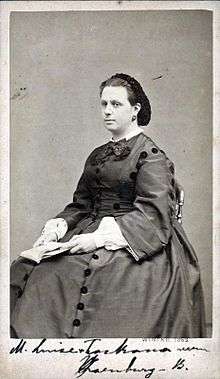Archduchess Maria Luisa of Austria, Princess of Tuscany
| Archduchess Maria Luisa of Austria | |||||
|---|---|---|---|---|---|
| Princess of Isenburg and Büdingen | |||||
 Archduchess Maria Luisa, c. 1860. | |||||
| Born |
31 October 1845 Florence, Grand Duchy of Tuscany | ||||
| Died | 27 October 1917 (aged 71) | ||||
| Spouse | Karl, Prince of Isenburg-Büdingen | ||||
| Issue |
Prince Leopold Wolfgang Princess Antonia Princess Maria Prince Franz Joseph Prince Victor Salvator Prince Alfonso Princess Elizabeth Princess Adelaide | ||||
| |||||
| House |
House of Habsburg-Lorraine House of Isenburg-Büdingen | ||||
| Father | Leopold II, Grand Duke of Tuscany | ||||
| Mother | Princess Maria Antonia of Bourbon-Two Sicilies | ||||
| Religion | Roman Catholicism | ||||
Archduchess Maria Luisa of Austria, Princess of Tuscany (full name: Maria Luisa Annunziata Anna Giovanna Giuseppa Antonietta Filomena Apollonia Tommasa) (31 October 1845 – 27 October 1917) was a Princess of Tuscany, and later Princess of Isenburg and Büdingen.
Biography

Maria Luisa[1] was born in Florence, the eighth daughter of Leopold II, Grand Duke of Tuscany and his second wife, Princess Maria Antonia of the Two Sicilies. Her paternal grandparents were Ferdinand III, Grand Duke of Tuscany and Princess Luisa of Naples and Sicily. Her maternal grandparents were King Francis I of the Two Sicilies and María Isabella of Spain, Infanta of Spain. She was baptized in Florence's Battistero di San Giovanni as Maria Luisa Annunziata Anna Giovanna Giuseppa Antonietta Filomena Apollonia Tommasa, in honor of his father's sister, Princess Maria Luisa (1799-1857), affectionately called "the little hunchback" by the people of Florence.
Maria Luisa was born in a time of peace and prosperity for the Grand Duchy of Tuscany, and she was raised in an loving family environment. However, she was first confronted with the dangers of her position at a young age, due to the Revolutions of 1848. In February 1849, the Grand Ducal family decided to go to Gaeta as a security measure. The Grand Duchess Maria Antonia traveled separately with her two younger children, Maria Luisa and Ludwig. The family remained in Gaeta for several months and was unable to return to Florence until July 28, 1849.
Later, Maria Luisa and her family were forced to flee Florence on April 27, 1859, with the outbreak of a revolution inspired by the war by France and Sardinia-Piedmont against Austria as part of the unification of Italy. The family took refuge in Austria. At the end of the war, her father Leopold II abdicated on July 21, and his brother Ferdinand succeeded him as Grand Duke.
On May 31, 1865, at the age of twenty, Maria Luisa married Karl, Prince of Isenburg-Büdingen (1838-1899). Her husband was a grandson of Karl, last sovereign Prince of Isenburg. The couple had nine children. Karl died at the age of sixty, and Maria Luisa died during World War I, in 1917. They are the ancestors of Sophie, Princess of Prussia, wife of Georg Friedrich, Prince of Prussia, the head of the House of Hohenzollern.
Issue
Maria Luisa and Karl had nine children:
- Prince Leopold Wolfgang (1866–1933), succeeded his father as Prince of Isenburg. In 1902 he wed Princess Olga of Saxe-Weimar-Eisenach (1869–1924), daughter of Prince Hermann of Saxe-Weimar-Eisenach, and had issue. He married secondly in 1924 Countess Marie von Dürckheim-Montmartin (1880–1937), without issue.
- Princess Maria Antonia (1867–1943).
- Princess Maria Michaele (1868–1919).
- Prince Franz Joseph (1869–1939), married Princess Friederike of Solms-Braunfels, and had issue. They are the great-grandparents of Sophie, Princess of Prussia.
- Prince Karl Joseph (1871–1951), married morganatically Bertha Lewis.
- Prince Victor Salvator (1872–1946), married Leontine Rohrer.
- Prince Alfonso Maria (1875–1951), married in 1900 Countess Pauline Marie of Beaufort-Spontin (1876–1955), and had issue.
- Princess Marie Elizabeth (1877–1943), married Georg Beyer
- Princess Adelaide Maria (1878–1936).
Ancestry
References
- ↑ van de Pas, Leo. "Marie Luise, Archduchess of Austria, Princess of Tuscany". Genealogics .org. Retrieved 2012-06-05.